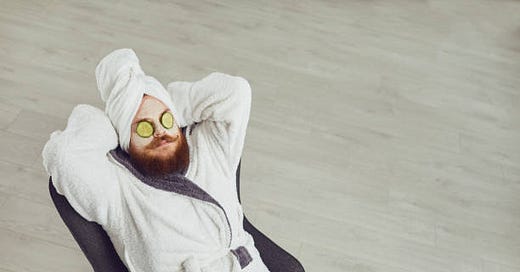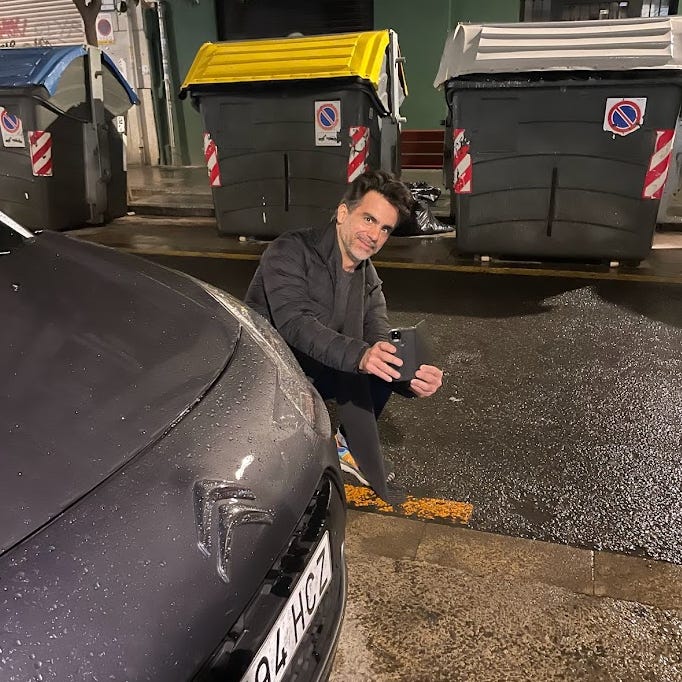I’ve always like to swim despite my original, traumatic first exposure to a swimming pool. Aside from swimming being a beneficial, all-around exercise, it doesn’t require the use of any additional equipment such as a ball, bat, or racquet. Due to my dysfunctional hand/eye coordination and having the worst qualities of left-handedness, anything sport that requires the use of specialized equipment tends to make me feel like a total klutz. Swimming only requires a swimsuit and not much more.
In 1988, I was dating a guy from DC who was a bit of a jock as well as an IT geek (or as much as a computer nerd as one could be in the late 80s). He was a member of several gay men’s sports teams including, but not limited to, volleyball, basketball, and water polo. During our brief long-distance relationship, I cheered him from the sidelines during several of his matches but was especially intrigued with water polo. I thought that since I could swim, maybe I could handle that. The ball was fairly large, especially when compared to a baseball or tennis ball, so maybe I could manage to actually catch it and throw it without looking like a dork. I mentioned this to a friend of mine, and he told me about a mutual friend in Philadelphia that was interested in starting up a gay men’s aquatics team in the city. I met his friend, Randy, and he somehow convinced me that I should lead this new venture and that he’d be willing to coach. One thing led to another and before I could say Greg Louganis, the Philadelphia Fins sprung to life. The team, I’m pleased to say, continues to thrive as part of US Masters Swimming.1 As for my water polo playing abilities, not so much. It takes more than an interest in big balls to play water polo effectively. Also, wearing corrective lenses is not an option in water polo. Goggles or contacts could lead to serious injury if hit by said big ball or an opposing player (and it can get rough in the pool). Since I have no depth perception without glasses or contacts, I was essentially blind in the water during matches. That didn’t help our team all that much. Nevertheless, I continued to swim as part of the group until I moved to Trenton, New Jersey (a long story but we’ll leave it at that for now).
Despite leaving the team that I founded, I continued to swim as often as possible. Whether it was at school or various gyms, I centered my workouts around pool time. In Maryland, however, it was difficult to find a gym with a pool designed for lap swimming. Most Marylanders joined swim clubs or pools separate from gyms. I would have thought that in the land of Katie Ledecky and Michael Phelps, there’d be more pools open to the public. Sadly, I think that might be due to the unfortunate racist history of Maryland’s public pools, but that’s a topic for people more well-versed on the subject.
Arriving in Arizona, I discovered that pools were in abundance. Although backyard pools were de rigeur, many health clubs had a pool, usually an outdoor one. When Les and I joined the Jewish Community Center in Scottsdale, commonly known as “the J,” they had an amazing outdoor aquatics facility that included three pools. The lap pool was especially notable, with its ten lanes and resort-like atmosphere. Regrettably, the open environment meant that summer monsoons forced the pool to close due to severe wind and lightning. And although the pool was heated during the winter, entering and leaving the pool in near-freezing temperatures were enough to challenge even the heartiest of souls. I was not that resilient, yet our friend Alan always tried to persuade me to swim during the colder months. I told him I would but only if he promised to have a warm, plush terrycloth robe waiting for me after exiting the water.
This brings me finally to my swimming experience in Barcelona. As the site of the 1992 Summer Olympic Games, Barcelona transformed from a relatively obscure European city into a vibrant and culturally diverse hot spot that is (some would say unfortunately) at the top of tourists’ must-visit lists. It does appear that despite the debates over whether the Olympics has been beneficial or detrimental to the city,2 on the surface at least, its citizens do seem active. The nearby futbol (soccer) pitch is regularly active with players of all ages. In the morning when I walk Farrah, I always encounter runners and cyclists in the early hours. Additionally, our gym is always crowded, regardless of the time of day. Classes are generally full, and instructors are engaged. As for the aquatics program, our gym has three pools and a spa. They are all indoors, which means year-round swimming in a comfort-controlled environment. Sounds great for the most part, except there are a few drawbacks, one of which might be unique to the culture here.
At the J and other pools where I swam, it was common to reserve lanes for lap swimming, usually for 45 minutes to an hour. Here at the pool where I belong, it’s sort of first come, first serve. I say sort of because even if you do manage to score a free lane, you are expected to share the lane if you are asked to. Since there are only five lanes instead of the usual ten at most lap pools, this is a regular occurrence. I don’t mind sharing, per se. If I arrive and all lanes are occupied, I will usually ask someone close to my age (since many younger swimmers are speed demons compared to me) if they can share the lane with me (¿Podria compartir este carril?). They usually agree but will ask if I want to swim on the right (a la derecha) or the left (a la izquierda) or in a circle (circular). I prefer to stay to one side as do most other swimmers. Accordingly, other swimmers will ask me if I’m alone in a lane if I’d like to share, to which I always agree. Yet there are occasional circumstances when this convention does not apply, sometimes with less than optimal results.
A swimmer will sometimes dive into a lane, unaware of the consequences of their failure to alert the other person of their presence. These instances have usually resulted in near-collisions for me due to the other swimmers’ inattention or ignorance. They usually require a “gentle” reminder from me or a staff member, but it has left me dumbstruck, especially considering the safety ramifications. Yet, I have find this has happened elsewhere. Our friend Mike belongs to another club, and he told us that it’s occurred at his pool. I never experienced it at the J and only once at a pool in New Jersey and even then it was elementary school-age children playing in the lap lanes when they shouldn’t have been, not adults as has been the case here. I do find this odd. As someone who is disposed to routine and order, my innate bias tells me that a reservation system would alleviate this problem. At our gym, we are required to register for fitness classes at the gym so why not for lap swimming too? Despite these sporadic disruptions, the pool is well-maintained and is more than suitable for me or anyone to enjoy year-round swimming.
Recently, I discovered that next year, in 2026, Gay Games XII will be held in the host city of València.3 That’s exciting news since Valencia is so close and Les and I even have connections to the city.4 I have never attended the Gay Games so we’re going to plan on attending. It would be great if the Philadelphia Fins are able to swim in some of the events. Recently, I’ve connected with a couple of their board members. Perhaps we can figure a way to have Fins representation in València next year!
Works Cited
1Philadelphia Fins, https://www.philadelphiafins.org/index.html. Accessed 2 February 2025.
2 Amat, Jordi. “El Raval: The Cycle of ’92 and the Olympic Hangover.” The Passenger- Barcelona, edited by Simon Smith, Europa Editions, 2023, pp. 9-25.
3 Gay Games, https://www.gaygames.org/. Accessed 2 February 2025.
4 Pendola, Rocco. “Never Retire: Living the Semi-Retired Life.” Substack. Accessed 2 February 2025.








Thanks for this info about the Gay Games and the mention! Hopefully we'll see you guys here before the Gay Games!
Thank you for sharing. I’ve never been a big swimmer but Kris will jump into the water anywhere. He shares your lament about swimmers who dive into his lane unexpectedly.